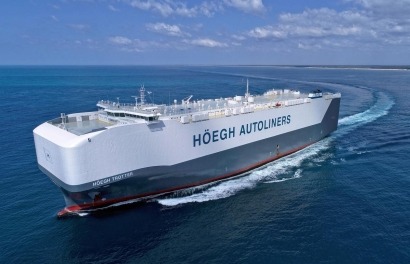
This partnership is aligned with the strategies of both companies: Höegh Autoliners is dedicated to offering ocean transportation solutions with a focus on reducing environmental impact and supporting the decarbonisation of its customers' supply chains. VARO’s mission is to be the partner of choice for customers in the energy transition by providing them with the low-carbon energy solutions they need in order to decarbonise. The companies bring together the capabilities that enable to reduce the GHG emissions associated with the transport and distribution of goods.
Dev Sanyal, CEO of VARO stated, "Höegh Autoliners is not just a customer but a strategic partner. I am delighted that VARO will be collaborating with Höegh to forge innovative solutions, share insights, and drive sustainable progress, contributing to the ambitions set bythe International MaritimeOrganization (IMO) to reduce the carbon intensity of emissions from shipping by at least 40% by 2030, and 70% by 2050, compared with 2008 levels. Together, we aim to help decarbonize deep-sea shipping, leveraging the potential of biofuels and ensuring a more sustainable future for our customers.”
Andreas Enger, CEO of Höegh Autoliners, commented on the partnership, stating, "This marks a significant step forward in our commitment to becoming a leader in carbon-neutral deep-sea shipping and in our strategy to reduce our environmental footprint and combat climate change. We are pleased to provide our customers with greener deep-sea transportation solutions as a step toward more environmentally responsible shipping.”
VARO is playing a leading role in biofuels in Europe. In line with its ONE VARO Transformation strategy, its biofuels business, is focused on reducing the use of food and feed as feedstocks and building assets to manufacture advanced biofuels derived from waste and advanced feedstocks, including Sustainable Aviation Fuels (SAF) and Renewable Diesel (HVO).
Höegh Autoliners shares VARO's commitment to sustainability and the reduction of carbon emissions in the maritime industry. The company has been actively working toward achieving its vision of a sustainable future for deep-sea shipping. Höegh Autoliners is dedicated to offering ocean transportation solutions with a focus on reducing environmental impact and supporting the decarbonization of its customers' supply chains.
Biofuels, especially those derived from waste and advanced feedstocks, significantly reducing CO2 and other emissions, such as sulfur oxides. Their production from organic materials, such as waste oils, contributes to reducing waste and efficient resource utilization. With lower carbon intensity compared to conventional fossil fuels, biofuels release fewer carbon emissions per unit of energy, contributing to a cleaner and greener maritime industry.
Furthermore, biofuels are compatible with existing ship engines and infrastructure, facilitating a smooth transition to more sustainable fuel options without costly modifications, and they have a positive impact on air quality by emitting fewer pollutants that affect human health.

